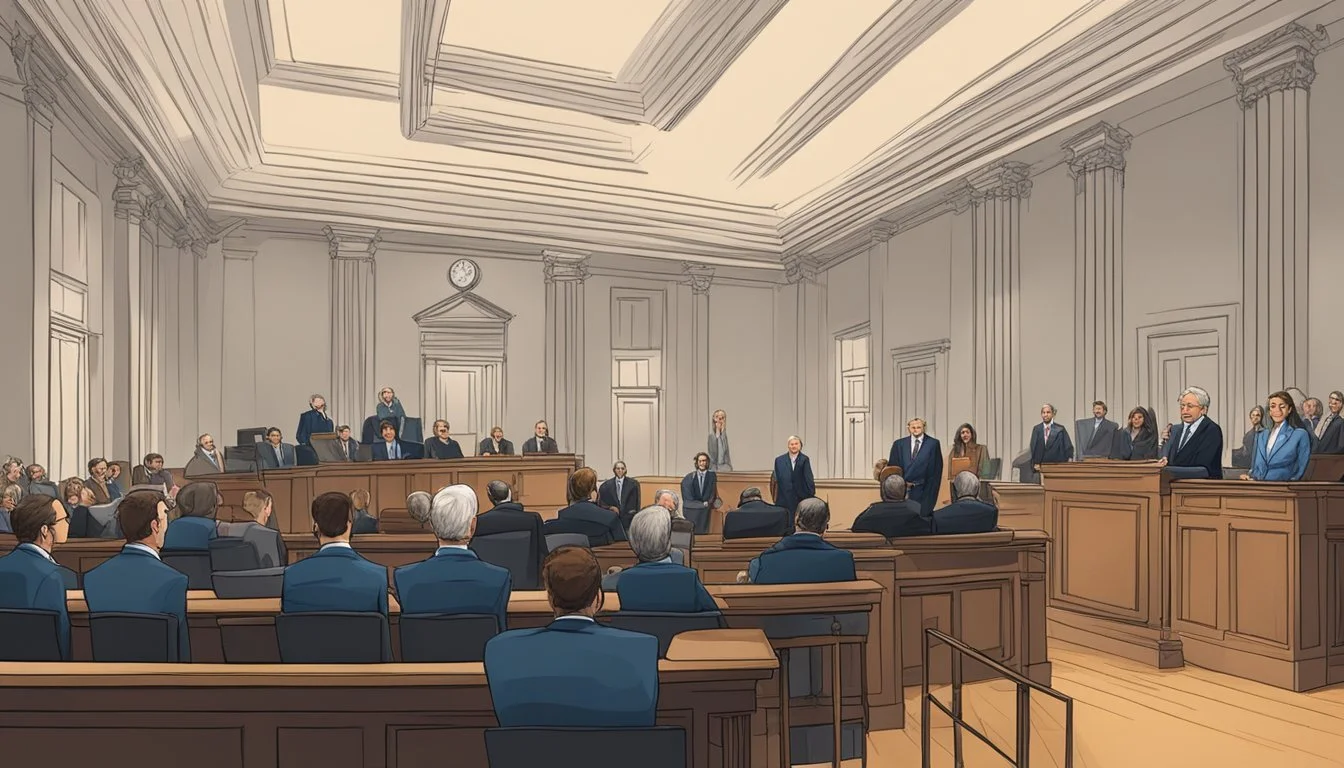The Menendez Case: Its Influence on Criminal Psychology Studies
Reshaping Legal Perspectives
The Menendez case captivated America in the early 1990s, shining a spotlight on family dynamics, abuse allegations, and the role of psychology in criminal trials. Lyle and Erik Menendez, convicted of murdering their parents in their Beverly Hills home, became central figures in a legal drama that would reshape public perceptions of criminal psychology.
The trial's impact on criminal psychology studies has been significant, prompting researchers to examine the complex interplay between childhood trauma, family systems, and violent behavior. This case challenged traditional notions of motive and culpability, forcing legal and mental health professionals to reconsider how psychological factors should be weighed in courtroom proceedings.
Decades later, the Menendez case continues to influence discussions on the intersection of psychology and law. Its legacy extends beyond the courtroom, sparking ongoing debates about the effects of childhood abuse, the limits of self-defense claims, and the role of expert psychological testimony in criminal trials.
Historical Context of the Menendez Case
The Menendez case shocked the nation in 1989, involving two brothers who murdered their wealthy parents in Beverly Hills. This high-profile crime captivated public attention and raised complex questions about family dynamics, abuse, and criminal psychology.
Biographies of Lyle and Erik Menendez
Lyle and Erik Menendez were born into privilege as the sons of Jose and Kitty Menendez. Lyle, born in 1968, was the older brother. Erik, born in 1970, was the younger sibling. The brothers grew up in an affluent household in Beverly Hills, California.
Their father, Jose Menendez, was a successful entertainment executive. Kitty Menendez, their mother, was a former beauty queen. Despite their outward appearance of wealth and success, the family reportedly had a complex and troubled dynamic.
The brothers attended prestigious schools and appeared to lead charmed lives. However, their later testimonies would paint a darker picture of their upbringing, alleging abuse within the family.
The Murder of Jose and Kitty Menendez
On August 20, 1989, Jose and Kitty Menendez were shot multiple times in their Beverly Hills mansion. The brutal nature of the killings shocked the community. Initially, investigators suspected a mob hit due to Jose's business connections.
The brothers called 911, reporting they had discovered their parents' bodies after returning from a movie. They appeared distraught and were not immediately considered suspects.
As the investigation progressed, inconsistencies in the brothers' stories emerged. Their lavish spending spree following the murders raised suspicions. In March 1990, both Lyle and Erik were arrested and charged with the murders of their parents.
The case gained national attention, fueled by the family's wealth, the brutality of the crime, and the shocking allegations that would emerge during the trial.
Legal Proceedings and Outcomes
The Menendez case involved complex legal proceedings spanning several years. Key events included multiple trials, controversial verdicts, and subsequent appeals that shaped the brothers' fate.
Chronology of the Menendez Trials
The Menendez brothers were arrested in March 1990 for the murders of their parents. Their first trial began in July 1993, with separate juries for each brother. This trial ended in hung juries for both Lyle and Erik Menendez.
A second trial started in August 1995. This time, a single jury heard the case against both brothers. The prosecution argued that the murders were motivated by greed and financial gain.
Verdicts and Sentencing
In March 1996, Lyle and Erik Menendez were found guilty of first-degree murder. The jury rejected their claims of abuse and self-defense. Both brothers received life sentences without the possibility of parole.
The judge ordered them to serve their sentences in separate prisons. This decision aimed to prevent the brothers from collaborating on future legal efforts.
Parole and Appeals
Since their conviction, the Menendez brothers have filed multiple appeals. They've challenged various aspects of their trial and sentencing. However, these appeals have been largely unsuccessful.
In recent years, new evidence has emerged, prompting renewed interest in the case. The California Supreme Court has not granted any of their appeals to date.
The brothers remain ineligible for parole due to their life sentences. Their case continues to be a subject of legal and public debate.
Psychological Analysis
The Menendez case sparked intense debate about childhood trauma, long-term abuse effects, and criminal behavior. Psychological experts examined complex factors underlying the brothers' actions.
Childhood Trauma and Abuse Claims
Erik and Lyle Menendez claimed they suffered years of sexual and emotional abuse from their father. They alleged this trauma led to their violent actions. Some experts testified the brothers exhibited signs consistent with abuse victims, including anxiety and dissociation.
Critics argued the abuse claims were fabricated to gain sympathy. The prosecution contended there was no evidence of sexual abuse prior to the trial.
The case highlighted challenges in verifying childhood abuse allegations, especially when the accused abuser is deceased. It raised questions about how courts should handle such claims in criminal proceedings.
Long-Term Effects of Abuse
Research shows childhood abuse can have profound, lasting impacts on mental health and behavior. Studies indicate abuse survivors often struggle with:
Depression and anxiety disorders
Substance abuse issues
Difficulty forming healthy relationships
Increased risk of criminal behavior
The Menendez brothers' defense team argued their alleged abuse caused severe psychological damage. They claimed this trauma impaired the brothers' judgment and ability to regulate emotions.
Prosecutors countered that many abuse survivors do not commit violent crimes. They asserted other factors, like greed, motivated the killings.
PTSD and Criminal Behavior
The defense claimed both brothers suffered from post-traumatic stress disorder (PTSD) due to their alleged abuse. PTSD symptoms can include:
Hypervigilance
Emotional numbness
Flashbacks
Angry outbursts
Some experts testified these symptoms could explain the brothers' extreme reaction to perceived threats from their parents. Critics argued PTSD alone does not typically lead to premeditated murder.
The case sparked debate about how courts should consider PTSD in criminal cases. It raised ethical questions about using mental health diagnoses as legal defenses for violent acts.
Media and Public Perception
The Menendez case garnered intense media attention, shaping public opinion and influencing criminal psychology studies. Television coverage, courtroom broadcasts, and true crime narratives played pivotal roles in how the public perceived the brothers and their alleged crimes.
Media Coverage During the Trial
Extensive news reports and televised updates brought the Menendez case into millions of homes. Major networks dedicated significant airtime to the trial, featuring expert commentators and legal analysts. This constant exposure led to widespread public interest and debate.
Newspapers and magazines published in-depth articles, often focusing on the brothers' affluent background and the shocking nature of the crimes. The media's portrayal of Lyle and Erik Menendez varied, sometimes depicting them as cold-blooded killers, other times as victims of abuse.
Public opinion fluctuated as new details emerged. The case became a topic of daily conversation, with many forming strong views based on media reports rather than courtroom evidence.
Influence of Court TV
Court TV's gavel-to-gavel coverage of the Menendez trial marked a significant moment in legal broadcasting. The network provided viewers unprecedented access to courtroom proceedings, allowing them to witness testimony and arguments firsthand.
This direct access had a profound impact on public perception. Viewers could form their own opinions based on unfiltered courtroom footage, rather than relying solely on news summaries or expert interpretations.
Court TV's coverage also sparked discussions about the role of cameras in courtrooms and their potential influence on judicial proceedings. The Menendez trial became a case study in the intersection of media, law, and public opinion.
True Crime Narratives and Portrayals
The Menendez case has been the subject of numerous true crime books, documentaries, and dramatizations. These portrayals have continued to shape public perception long after the trial concluded.
Ryan Murphy's "American Crime Story" series brought renewed attention to the case, offering a dramatized version of events. Such retellings often blend fact with dramatic interpretation, potentially influencing viewers' understanding of the case.
Documentaries like "The Menendez Murders: Erik Tells All" have provided new perspectives, sometimes challenging earlier narratives. These productions have reignited public interest and debate about the brothers' guilt, their motivations, and the justice system's handling of the case.
The ongoing fascination with the Menendez case in true crime media reflects its enduring impact on popular culture and criminal psychology studies.
Social and Cultural Impact
The Menendez case profoundly shaped public discourse and media portrayals of criminal psychology. It sparked debates on ethical issues in legal defenses and influenced entertainment depictions of high-profile trials.
The Case in Entertainment and Television
The Menendez brothers' trial became a media sensation, captivating television audiences nationwide. Major networks provided extensive coverage, turning the case into a real-life courtroom drama.
True crime documentaries and dramatizations followed, with films and TV series exploring the brothers' story. These productions often blurred the lines between fact and speculation, fueling public fascination.
Social media platforms later reignited interest in the case, with younger generations discovering and debating its complexities. This ongoing attention highlights the enduring impact of the Menendez case on popular culture.
Implications for Criminal Psychology
The Menendez trial brought complex psychological concepts into the public eye. It sparked discussions about family dynamics, trauma, and the potential long-term effects of abuse.
Forensic psychologists gained prominence, explaining concepts like parricide and abuse-excuse defenses to the public. This increased visibility led to more research into the psychological factors behind familial crimes.
The case also influenced how experts approach evaluations of defendants with claimed histories of abuse. It underscored the need for thorough psychological assessments in high-stakes criminal cases.
Ethical Considerations in Legal Defenses
The Menendez brothers' abuse allegations raised ethical questions about confidentiality and disclosure in therapy. Their defense strategy put client-therapist privilege under scrutiny.
Legal and mental health professionals debated the ethics of using past trauma as a defense for violent crimes. This led to discussions about the balance between accountability and understanding psychological factors in criminal behavior.
The American Psychological Association (APA) revised guidelines on therapist testimony in court cases. These changes aimed to clarify ethical obligations when patient disclosures involve serious crimes.
Aftermath and Legacy
The Menendez case left an indelible mark on the American legal system and popular culture. Its impact extended far beyond the courtroom, influencing public perceptions of family dynamics, trauma, and criminal justice.
Post-Conviction Lives of Lyle and Erik
Lyle and Erik Menendez have spent decades behind bars since their 1996 conviction. Both brothers married while incarcerated, with Lyle tying the knot twice. They were initially held in separate prisons but were reunited at Richard J. Donovan Correctional Facility in San Diego in 2018.
Prison life has been a stark contrast to their once-privileged upbringing. The brothers have engaged in various educational and rehabilitation programs. Erik has worked as a telephone operator and tutor, while Lyle has taken on roles in the prison's print shop.
In recent years, their case has garnered renewed attention. Los Angeles County District Attorney George Gascón reviewed their case in 2021, though no changes to their sentences resulted from this examination.
Cultural References and Inspirations
The Menendez case has inspired numerous books, documentaries, and dramatizations. True crime enthusiasts have dissected every aspect of the crime scene and subsequent trials. The brothers' claims of self-defense and unresolved trauma continue to spark debate.
Television series like "Law & Order" and "American Crime Story" have featured storylines inspired by the case. Documentaries have explored the complexities of the brothers' relationship and their alleged motivations, including their desire for inheritance.
The case has become a touchstone in discussions about familial abuse, trauma, and the justice system's handling of such complex cases. It continues to be referenced in criminal psychology studies, illustrating the lasting impact of high-profile crimes on academic and public discourse.







